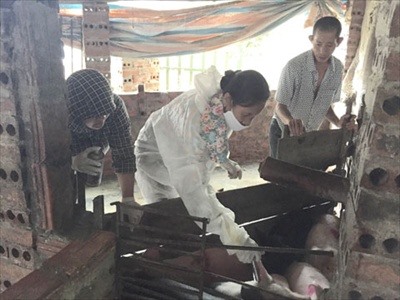 Society
Society

Though animal diseases have been under control so far, Việt Nam faces a high risk of epidemic outbreaks because of unfavourable weather conditions, an agriculture ministry official has said.
 |
| Vaccination is an effective method of preventing disease in livestock farming. – Photo www.qtv.vn |
HÀ NỘI — Though animal diseases have been under control so far, Việt Nam faces a high risk of epidemic outbreaks because of unfavourable weather conditions, an agriculture ministry official has said.
The animals’ immunity is low because of weather conditions, so they are vulnerable to diseases, he said.
Speaking at a meeting held last weekend to review disease prevention and control in livestock and aquatic species in 2016, Phạm Văn Đông, director general of Ministry of Agriculture and Rural Development’s (MARD) animal health department, called for increased vigilance to prevent outbreaks among cattle and poultry, especially of those that get transmitted to humans. At the meeting, Đông also set the agenda for 2017.
Since the start of this year, bird flu has been reported in 14 communes and districts across eight provinces, said Nguyễn Ngọc Tiến, head of animal epidemic division in the animal health department. The number of poultry that had to be culled is 18,300.
Both the number of communes that reported bird flu and the number of poultry culled have decreased two-fold compared with the previous year, Tiến said.
At least 2,740 cattle have been infected by the foot and mouth disease, across 60 locations in 12 provinces.
Tiến said animal diseases have been kept in check as strategies to control epidemic threats and outbreaks have been implemented in 60 of 63 provinces and cities. However, irregular veterinary services, lack of funding and not getting instructions on time pose challenges to the effort to prevent diseases, he added.
Đông said all animal health staff at local levels should be proactive at disease prevention work and must coordinate their activities with farmers and local authorities. The animal health sector must also increase efforts to teach safe practices in raising cattle and poultry.
He also suggested that the ministry should submit and get approved a national programme on disease control and prevention for the period 2016-20. — VNS




